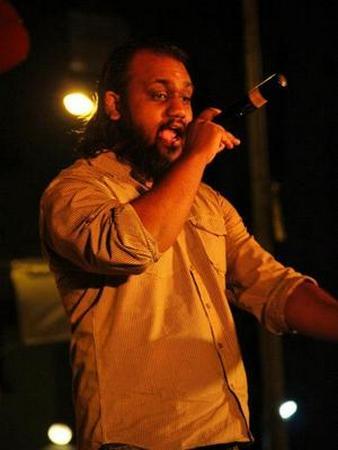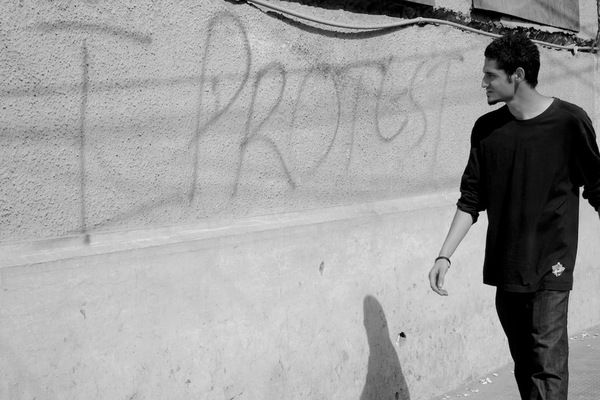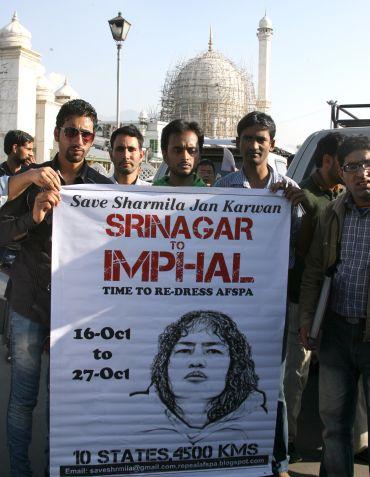 | « Back to article | Print this article |
'To make great art, one must experience life'
Better known in the music circuit as A-List, Ashwini Mishra decided to leave behind an assignment in branding and communications because he found it 'very difficult to take the corporate world seriously'. By this time he had already released an album and now began collaborating with everyone from Kashmiri producers and groups of Dalit poets.
One of the most well-known names in the music circuit, A-List has taken rap to where it belongs -- amongst the people. With no entourage or contract with any music label A-List's music speaks against the injustices in the society.
Mishra takes questions from Paloma Sharma on what it takes to be a rapper in a country where most don't even recognise the genre of his music:
Ashwini Mishra aka. A-List is perhaps best known for his controversial protest music that appeals to some but is taboo to others for the same reason -- the questions he asks The Man when he raps.
Originally hailing from Bihar, Mishra spent his early years in Saudi Arabia and the United States of America before finally coming back to Kolkata, India around the age of eleven. The older of two brothers and son to an advertising professional mother and engineer father, Mishra began experimenting with rap at an age when the rest of his peers had only just begun learning simple addition.
Today, Mishra's music stands as a testament to some of the most gruesome injustices in human history and not everyone can digest it. However, given the times that we live in, no one can afford to ignore it either.
Mishra calls himself a people's artist and has neither an entourage nor a label that he is signed to. His status as an independent musician and his rapidly increasing popularity put him in a position that not many have the opportunity to experience.
The 28-year-old Mumbai-based self-described ex-'corporate stooge' left behind a comfortable gig in branding and communications to take up more meaningful work as a socially conscious filmmaker because he found it 'very difficult to take the corporate world seriously'.
Mishra is currently working on his second album after 2006's I Can't Lose as we ask him questions about what it is like to be rapper in a country where the majority don't recognise his genre as music.
Of all the genres of music in the world, what led you to choose hip hop?
As a young boy, I once stumble on this tape of Run DMC in a shop in a petrol pump. I got my parents to buy me the album and I just fell in love with the aesthetics, the lingo and the very sound of hip hop. Hip hop really appealed to me is it's a very individualistic form of music. There is so much more you can say in a rap song due to space for lyricism than you can in most other genres.
What triggered the transformation from Ashwini Mishra to A-List?
I was a hip hop fan ever since I had been introduced to Run DMC. But I was more interested in writing poetry. But I realised blank verse wasn't my thing and I really enjoyed playing with rhymes. Eventually it hit me: I was basically writing rap lyrics. So I started performing and pushing myself as a hip hop artist. I am often asked how and why I came up with the name "A-List". Honestly, I can't remember. I think the name can be attributed to a combination of being young and a little high. But the name has stuck over the years.
Hip hop was a lot less popular with the masses when you started off. What was the biggest obstacle that you faced in your journey?
One of the biggest obstacles I faced while rapping way back in 2004 was that especially in Calcutta, the entire rock music circle did not consider hip hop to be music. I was constantly in situations where I had to prove not only myself, but also my genre. But as difficult as it was to be the only rapper in a scene when rap was not taken seriously, I think that also toughened me as an artist. It was also a good challenge to try and convert some of my audience and it always felt good to be able to do that.
You've been involved in your fair share of feminist struggles but a lot of the language used in popular hip hop is very misogynistic and homophobic. How do you tackle that in your music?
This is one of the major challenges I face in my role not just as a hip hop artist but also as a member of the Indian hip hop underground. There is a constant struggle to not let our scene be appropriated by the same mainstream misogyny and homophobia. But since a lot of hip hop artists simply ape American Hip Hop, it gets difficult. Through my own music I try to set an example to reject the misogyny and homophobia that sadly has become a staple part of much hip hop fare. Beyond this, I try to talk to the younger artists and educate them to the need to stand up to homophobia and misogyny, both as artists and individuals.
Do you think the concept of artistic freedom applies to popular Indian mainstream artistes who largely ignore or over-simplify grave social issues in their work?
I certainly do not insist everyone should only make conscious or political music. But I do think the mainstream needs to stop putting art in a cocoon and needs to resort to more original expressions. If you allow space for that, I feel we will see more nuanced takes on issues in the work.
'Be original, find your own sound and style'
Why haven't you signed up with a label yet?
I have always resisted signing with a label because I feel it would limit my artistic freedom. Not just the freedom to say what I want in my music, but also the freedom to release it as and when I want without any of that marketing nonsense. The politics and freedom of my work is too important for me. In 9 years, I have never even sent a demo to a label.
Do you feel that being a people's artiste gets in the way of being wealthy and famous, or can both states exist together peacefully?
Not necessarily. If you look at an artiste like Macklemore in the US who has recently had a few platinum singles, you will see conscious music can be commercially big as well. It really boils down to what your priorities are. It gets tricky when the industry is controlled by those who don't think so but there is always a way around.
There's a growing non-Bollywood music scene in India. What upcoming bands/performers are you particularly fond of?
In the Indie scene, I really enjoy Bombay Bassment, Live Banned, Delhi Sultanate and The Skavengers, to name a few. I was also very impressed with Imphal Talkies. Within the hip hop underground, MC Kash, Haze Kay, Manmeet Kaur, Shyn9n, Enkore, D'Evil, Kav-E, Noxious D, Mo Boucher and Street Academics. I have had the honour of collaborating with some of these rappers and they are amazing.
What would your message be to young rappers who are trying to break into India's hip hop scene?
Be original. Try and find your own sound and style. Grab any opportunity to perform and craft your stage presence. Beyond that, patience is also key. The hip hop scene in India is still developing so make sure you keep that in mind. Pride is important, but egos are a waste. Always be open to collaborating.
While still earning your high school/ undergraduate degree did you ever consider dropping out to further your rapping career? Has your formal education helped you with your music?
I never really wanted to drop out for a rapping 'career'. More than having a rap career, I wanted to make interesting music. So it was important to me that I not be one-dimensional. I think my education has helped me there. I believe in the notion that to make great art, one must experience life.
You're often observed performing in simple shirts or even formal wear. That's quite unlike the regular hip hop 'uniform'. What's the story behind that?
I often get to the concerts straight from work. But also, I believe in letting my music speak for itself. The 'bling-bling' has never felt right. The persona you see on stage is what I am like otherwise also. So it would feel dishonest to play dress up.
Given a chance, which one would you choose and why -- open mic nights or concerts?
That's a tough question to answer. I think I enjoy performing at concerts more as I am a very physical performer so I like moving around during my songs. There the stage provides more space. But I love the post-performance stage in open mics as the intimate setting allows listeners to come and interact with you.
'Taking a stand on issues might have cost me a few commercial opportunities'
Do you prefer free styling or are you more comfortable with having your material prepared beforehand?
I prefer freestyling, although my written songs are more effective and obviously tighter. As far as songwriting goes, for me the kick of freestyling live is something I can never get tired of.
Your songs are also centred on social and political issues like AFSPA, prostitution etc. You're obviously not shy about standing up for your beliefs. Has that ever hindered your rapping career?
The way I see it my stands on issues might have cost me a few commercial opportunities but considering the music I make, I would not be interested in those in the first place. On the other hand, my stands on issues have helped me reach out to those involved in the causes who might not be hip hop fans but appreciate my music for the message. In its own way, it has helped my career, albeit not in the traditional sense.
What are some of the things young musicians should be prepared for when they begin their careers?
Be prepared to have a DIY ethic. You will need to plan out how you want to take your career in your own hands in terms of your sound, making videos, gigs, the whole hog. Be prepared for a lot of pipeline dreams and a fair bit of rejection. But long as you stick to it, sooner or later the quality of music shines through. Also networking helps. Being a people's person is a big plus.
Do you think you'll ever take up music full-time?
At one point of time, I would have consider a full-time music career if it was sustainable. But to be honest, I like the idea of having another source of income so I don't have to compromise on the politics and content of my music. So at least as of now, I don't see myself doing music full time.
What are the best and the worst parts of being a rapper in a country where the music scene is largely dominated by Bollywood and religious music?
The best part is that you are often an ambassador for hip hop to an audience who is not exposed to the music. This allows you much scope to create a legacy for hip hop that could inspire both artists and listeners to go beyond obvious notions of rap. The worst part is the lack of a solid listening base. But with my brand of protest hip hop finding an audience of largely non hip hop heads, I think that problem can also be seen as an opportunity.
Who are some of the artistes you'd like to collaborate with in the future?
If I were to come up with a wishlist, it would include Delhi Sultanate, MC Kash, Beghariyat Brigade from Pakistan who make stunning political music; I would absolutely love to collaborate with Kabir Kala Manch
Where do you think hip hop stands today in India and where do you see it in the next five years?
Hip hop in India today is at a peculiar stage. Punjab already has a booming hip hop industry albeit the lyrical content is mostly cliche and regressive. I predict we will see hip hop feature much more prominently in both the commercial and indie soundscapes in this country in the next five years. What remains to be seen is whether Indian hip hop goes the American way. Or maybe there can be elements that can fight to sustain the independent ethic of Indian hip hop and push for more interesting music. It is this battle for the soul of hip hop that motivates me to stay on in the scene and as they say, 'fight the good fight'.


